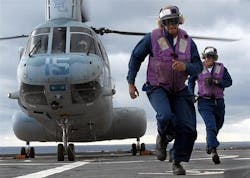Navy looks to BriarTek to provide man-overboard warning systems for surface ship fleet
PHILADELPHIA, 14 Jan. 2014. U.S. Navy shipboard safety experts needed automatic warning systems to alert authorities if sailors fall overboard during operations aboard Navy surface warships. They found their solution from BriarTek Inc. in Alexandria, Va.
Officials of the Naval Surface Warfare Center Carderock Division are awarding an $8.1 million contract to BriarTek for the Man-Overboard Indicator (MOBI) Ship Installation Support System. The contract, awarded late last week, is from Carderock's Ship System Engineering Station in Philadelphia.
Related: Navy pushing bridge-combat systems integration for new surface warships
The MOBI system consists of BriarTek's ORCA transmitters, receivers, and direction finders, and enables the immediate, rapid recovery of a sailor or marine who has fallen overboard. The Navy's MOBI program seeks to outfit each ship with a system that alerts the crew to a man-overboard event, so the crew can start a search and rescue as quickly as possible.
Each ship crew member working in areas where he risks falling overboard wears a special safety vest that includes an ORCA man-overboard transmitter.
Related: Malaysian Air Force, Navy to use SARBE personal locator beacons
After being fully immersed for 3-5 seconds, the water-activated ORCA transmitters immediately begin transmitting radio signals back to the ship that a crew member is in the water. At the same time the radio transmitter is activated, the strobe light is activated as well providing a visual marker to the survivor.
ORCA receivers aboard the bridges of surface ships receive signals from activated ORCA transmitters. Receivers announce man-overboard events by audible alarms that a survivor is in the water and in need of recovery.
ORCA receivers display the name of the sailor who has fallen from the ship, and the ship from which he or she fell. Even if the person in the water is not from that particular ship, if the victim is in range of the signal, the ORCA receiver sounds tone that someone has fallen off a ship nearby.
ORCA direction finders provides relative bearing to the survivor in the water in real-time, transmitting on an emergency frequency of 121.5 MHz. Ships and currents moving in opposite direction can put a lot of space between survivor and ship in a short amount of time, BriarTek officials say.
Navy officials awarded the MOBI contract to BriarTek sole-source because the company is the only responsible source for man-overboard alerting equipment for Navy ships, Navy officials say.
On this contract BriarTek will do the work at various ship home ports within and outside the continental U.S., and should be finished by early 2019.
For more information contact BriarTek online at www.briartek.com, or the Naval Surface Warfare Center-Philadelphia at www.navsea.navy.mil/nswc/Centers/Philadelphia.

